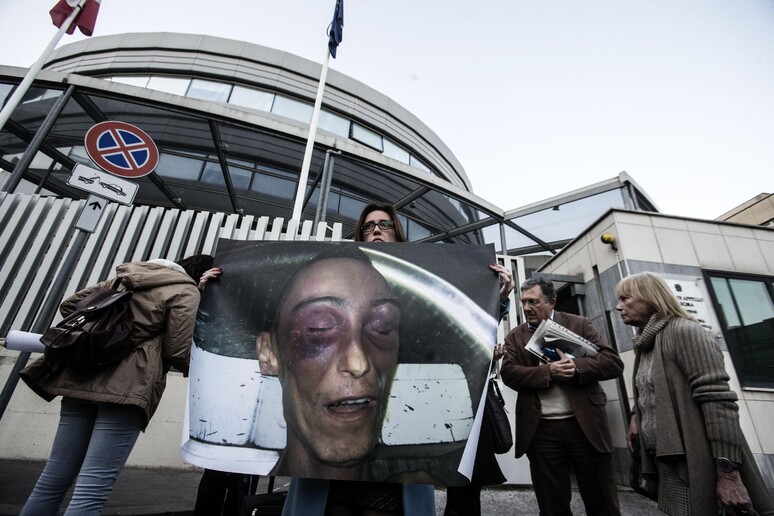Rome draughtsman Stefano Cucchi would probably not have died without the bone fractures inflicted on him by an alleged police beating, a court-appointed expert witness on Friday told a trial in which a Carabiniere defendant turned prosecution witness has accused three fellow Carabinieri of beating Cucchi so severely that he died of his injuries.
"No one can be certain," said the witness.
"But if there had not been the lesions then the subject would not have been hospitalised.
"Cucchi was immobile in the bed and could not move any more because of a fracture. If he had not been in this condition he would not have had an atonic blister but would probably have had the stimulus of diuresis.
"So if he had not had the fracture, Cucchi would not have been hospitalised and probably death would not have occurred, or it would have happened at another time".
The traumatic fracture of Cucchi's pelvis is thus said to be a "secondary" factor in his death in 2009, the expert said.
The "prime hypothesis" is "sudden and unexpected death in a patient affected by epilepsy," he said.
Cucchi's sister Ilaria, who has fought tirelessly for the truth about her brother's death amid years of cover-ups, said "it has taken 10 years, I have grown old in these courtrooms, but finally today for the first time I have heard an expert say that if Stefano had not been a victim of that beating which caused those injuries, he would never have ended up in the hospital and so would never have died." She said "now no one can say that Stefano Cucchi died because of his own fault," said family lawyer Fabio Anselmo.
The Cucchi case has dragged on for years, and recently senior Carabinieri officers were charged with covering up the case.
On May 21 the Carabinieri corps and the defence ministry and interior ministries asked to be civil plaintiffs in the case.
They asked to be considered injured parties in a new trial against eight Carabinieri including commanding officers accused of covering up the alleged brutality.
Premier Giuseppe Conte OK'd the interior ministry standing as plaintiff in the case.
In an initial trial, a Carabiniere defendant turned prosecution witness has accused three fellow Carabinieri of beating Cucchi so severely that he died of his injuries.
In the fresh preliminary hearing, Cucchi's family also filed to be civil plaintiffs as they are in the first trial, as well as Carabiniere Roberto Casamassima, prison guards, the military trade union and activist group Cittadinanzattiva.
On May 15 Casamassima, one of the key witnesses in the cover-up case, was accused of drug pushing.
Casamassima, who has accused other Carabinieri of covering up the Cucchi beating, has been accused by an unnamed informant.
Casamassima said a search of his home did not turn up any drugs, as erroneously reported in the press.
"No drugs were found," he said.
"This is the umpteenth attempt to delegitimise and intimidate me," he said.
Casamamassima is one of the key witnesses in the high-profile case, along with fellow cop Francesco Tedesco, another policeman who has become a witness for the prosecution.
Last month Tedesco told a court about the alleged brutality that allegedly caused the death in custody of Cucchi.
For several years the case looked set to end without anyone being brought to justice for Cucchi's death, allegedly because of a cover-up.
But a breakthrough came when Tedesco, one of five Carabinieri on trial in relation to Cucchi's death, accused two others of the beating that allegedly caused it.
"I say sorry to the Cucchi family and the penitentiary police officers who were defendants in the first trial (into the case)," Francesco Tedesco told a Rome court.
"The last few years have been an insurmountable wall for me".
Tedesco told the court that, after refusing to have his fingerprints taken, Cucchi was slapped hard by another defendant, Alessio Di Bernardo.
He said that Cucchi fell to the floor and hit his head.
Tedesco said that another defendant, Raffaele D'Alessandro, then kicked Cucchi in the face.
"It was not easy to report my colleagues," Tedesco said.
"The first person whom I told what happened was my lawyer. I hadn't told anyone in my life for 10 years...
"To say I was scared is not enough. I was literally terrorised.
"I was alone against a sort of wall. I panicked when I realized that my service notes had vanished".
He said that a superior, Marshall Roberto Mandolini, told him that "you have to follow the line of the force if you want to continue to be a Carabiniere".
"I sense a threat in his words," Tedesco said.
Cucchi's sister Ilaria, who has staged a tireless campaign for justice for her brother, expressed satisfaction at Tedesco's testimony.
"After 10 years of lies and cover-ups, the truth came into this courtroom told by the live voice of who was present that day," she said.
Ilaria Cucchia also welcomed support from the commander of the Carabinieri who said the corps would stand as plaintiff in the case.
"The statements and intentions expressed by the corps general commander make us finally feel less alone, he has lined up officially on the side of the truth," she said.
General Giovanni Nistri, the commander of the Carabinieri police force, reportedly pledged that he wants to get to the bottom of the death in a letter to Ilaria Cucchi sister.
"We have the same impatience as you to see full light shed on every aspect of the death of your brother so that the it is possible to adopt the consequent measures against those who failed to do their duty and respect the oath they swore," Nistri said in the letter dated March 11, which La Repubblica published.
ALL RIGHTS RESERVED © Copyright ANSA











